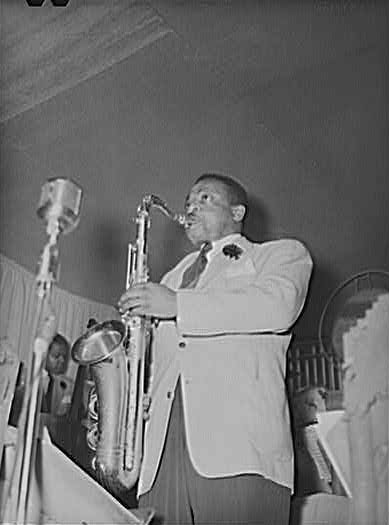I guess you’d call this creative nonfiction. A former colleague
recommended this book to me after reading some of my thoughts on the
life-affirming and health-inducing aspects of listening to jazz as I deal with
a visitation of brain cancer. The great irony is that the joyous practice of
improvisation in smoky clubs of the bebop era was so virulently
self-destructive for its musicians.
I don’t want this to sound over dramatized. Dyer immerses the reader in
an imagined subjective world of each musician, and that world is seldom as
harrowing as it appears from outside. Like some, Lester Young floats in the
isolation of an alcohol haze, never quite sure if he is living or already dead.
Thelonious Monk glories in an ongoing rage against fellow musicians and the
instrument he plays.
In Dyer’s evocative and impressionistic character sketches of several of
its iconic figures (Lester Young, Bud Powell, Chet Baker, Art Pepper, Ben
Webster, Thelonious Monk, Charles Mingus) we witness mostly downward
trajectories, as drugs, prison, racism, alcoholism, mental illness, and
violence take their toll. Whether or not you think of them as survivors, you
come to understand that the music they invented and played was an act of
defiance and subversion in the face of demons both internal and external.
 |
| Ben Webster, 1943 |
Meanwhile, some escape to Europe, where they find an
appreciative audience and are granted a reprieve from the vestiges of Jim Crow
discrimination. If anyone fares badly in the book, it is Chet Baker, who is portrayed
musically as someone whose seductiveness as a performer was always in the form
of promises he never kept—a self-absorption that verged on coitus interruptus.
Dyer
bases his book on biographical and historical accounts, but is more interested
in impressions than facts. The end result is a cross between dream and
documentary. While representing jazz composition and performance as driven by
the effort to capture evanescent and transcendent moods (think of Duke Ellington’s
“Mood Indigo”), Dyer’s lucidly clear prose is a wonder of poetic expression.
.jpg/471px-Thelonious_Monk%2C_Minton's_Playhouse%2C_New_York%2C_N.Y.%2C_ca._Sept._1947_(William_P._Gottlieb_06271).jpg) |
| Thelonious Monk, 1947 |
He closes the book with a stimulating essay on mid-century jazz, with an
overview of the wave of high-profile jazz musicians who followed in the decades
since (e.g., Miles Davis, Keith Jarrett), while illuminating some of the key issues
that have animated the discourse of musicologists who have never lost their
love for the genre. There is also a discography and a lengthy bibliography.
But Beautiful is currently
available in print and ebook formats at amazon, Barnes&Noble, and AbeBooks. For more of Friday's Forgotten Books, click on over to Patti Abbott's blog.
Image credits:
Wikimedia Commons
Coming up: Magazine
adverts, McClure’s (1907)

I'd probably enjoy reading about the personalities of these artists. Some interesting histories, I'm sure.
ReplyDeleteSame here. I'm a jazz fan, listen to a lot of it from the 1950 - 1965 period, so this might be right up my alley.
ReplyDeleteAppears to be a book right up your alley! Glad it was suggested to you as you find beautiful music to accompany your journey.
ReplyDeleteI'm not much of a jazz fan, but the book sounds ineresting.
ReplyDelete"But Beautiful," indeed. Let me recommend my all-time-favorite jazz composition, Oliver Nelson's "Stolen Moments," from the big-band version on the SWISS SUITE album, recorded live at the 1971 Montreux Jazz Festival.
ReplyDeleteThanks. I have included a vid of the septet's version of this wonderful song in my next blog post.
DeleteThis sounds great...and heart breaking. I went through a rock bio phase about 20 years ago. Started classifying celebrity deaths as accidents, tragedies, slow suicides, etc. Some, like Janice, were all three in one. Complex folks, musicians. Complex folks --all of us.
ReplyDeleteRichard, in researching early frontier fiction, I found similar stories about writers.
DeleteYup. Kingsley Amis never quite realized how good his metaphorical comparison of jazz musicians with sf writers was, particularly as he went on to incorrectly note, Neither form has produced anyone absolutely first-rate...which is part of what helped kill some of them both, the endless condescension, underappreciation, neglect, incomprehension. It's hip, right, kinda way out, y'know, infra dig! No, moron, it's fully realized art. Pay attention. Not just hip at its best.
Delete